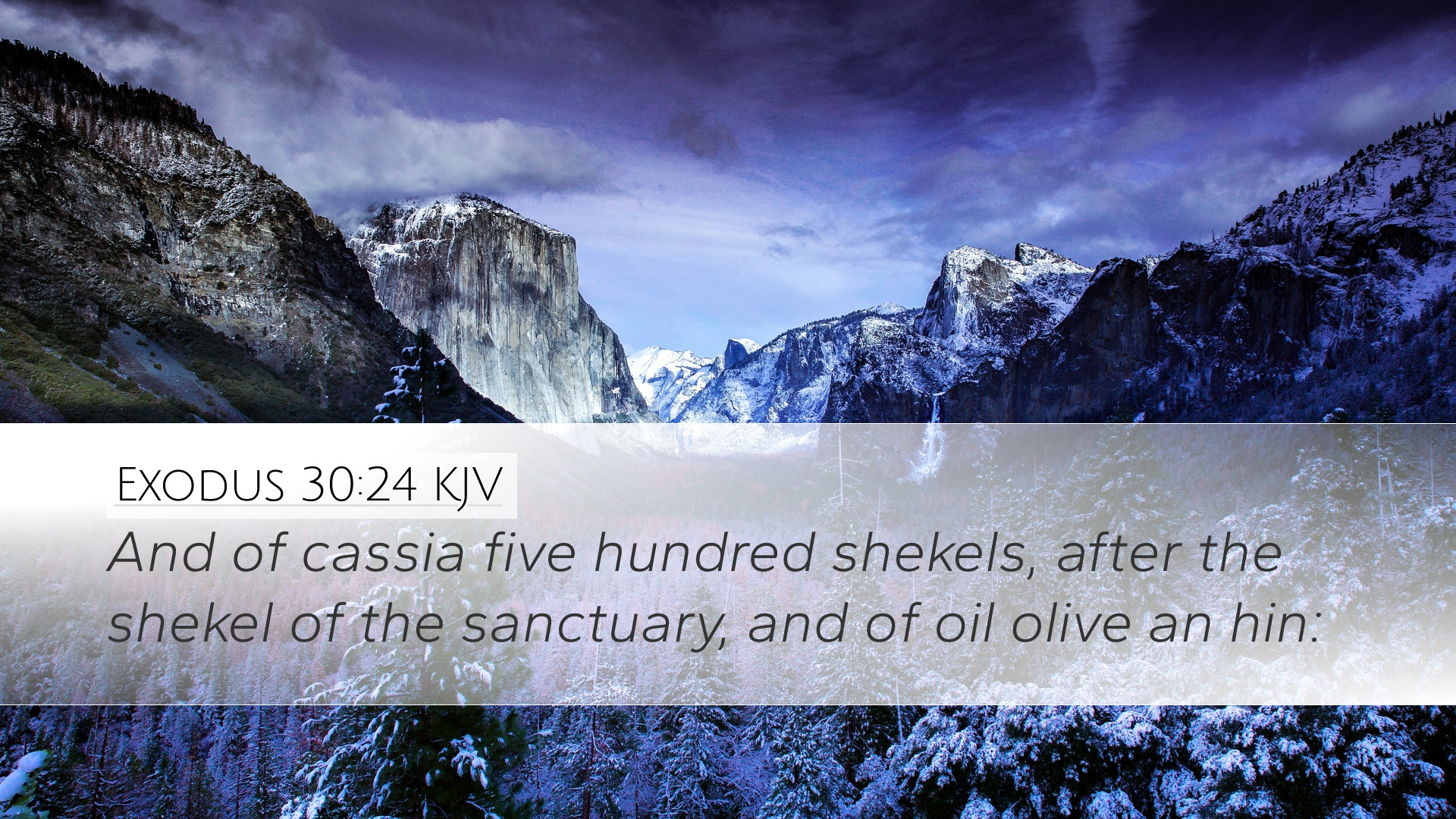Exodus 30:24 - A Comprehensive Commentary
Text of Exodus 30:24 (KJV): "And of cassia five hundred shekels, after the shekel of the sanctuary, and of olive oil an hin."
Introduction
The verse under consideration, Exodus 30:24, discusses specific ingredients for the holy anointing oil. This oil was crucial in the consecration of the priests and the tabernacle, symbolizing divine presence and empowerment.
The ingredients named in this passage are not arbitrary; each component carries rich theological symbolism and practical significance in the context of ancient Israel's worship and community life.
Context and Background
The book of Exodus captures the formative events of the Israelite community, focusing on their deliverance from Egypt and the establishment of their covenant with God at Sinai.
Specifically, Exodus 30 details instructions for the tabernacle's construction and the rituals associated with worship.
Commentary by Matthew Henry emphasizes that these detailed specifications not only reflect God’s holiness but also illustrate the importance of sacred worship.
Furthermore, the constitution of the anointing oil is indicative of God's desire to have a people set apart for Himself.
Analysis of Key Components
-
Cassia:
Cassia, mentioned here in verse 24, is an aromatic spice closely related to cinnamon.
Adam Clarke explains that its inclusion symbolizes the beauty and fragrance of holiness, which is essential in the life of God's people as they approach Him in worship.
-
Shekels of the Sanctuary:
The reference to "the shekel of the sanctuary" alludes to a standardized currency used in sacred matters, establishing the significance of setting apart resources for divine purposes.
Albert Barnes notes that the use of a specific weight signifies the importance of integrity and value in what is offered to God.
-
Olive Oil:
Olive oil, being a staple in the ancient diet and economy, symbolizes abundance and blessing.
In a spiritual sense, oil often represents the Holy Spirit, and its use in anointing signifies empowerment for service and leadership within the community of faith.
Theological Implications
The ingredients of the anointing oil convey profound theological truths about God’s relationship with His people.
The meticulous instructions reflect the seriousness of approaching God and underscore a covenant relationship predicated on holiness, reverence, and obedience.
Matthew Henry comments on how the anointing oil serves as a divine provision for the sanctification of those dedicated to the service of God.
This act sets the priests apart, marking them as intermediaries between God and the people.
Application for Today
For contemporary pastors, students, and theologians, this passage calls for reflection on the nature of worship and the ongoing relevance of consecration.
The concept of ‘anointing’ extends beyond a mere ritual; it challenges believers to seek a deeper relationship with the Holy Spirit.
The notion of being set apart for God’s use, as illustrated by the priests’ anointing, resonates with New Testament believers.
As Peter writes in 1 Peter 2:9, believers are "a chosen generation," called to reflect God’s glory in their lives.
Conclusion
Exodus 30:24 encapsulates essential themes in Scripture surrounding holiness, anointing, and service.
The rich symbolism present in the ingredients of the holy anointing oil serves as a reminder of the call to be set apart and empowered by the Holy Spirit.
As modern-day followers of Christ, understanding these Old Testament practices can enhance our appreciation for the sacrificial and redemptive work of Jesus, who ultimately fulfills the roles depicted in the priesthood and the anointing.


